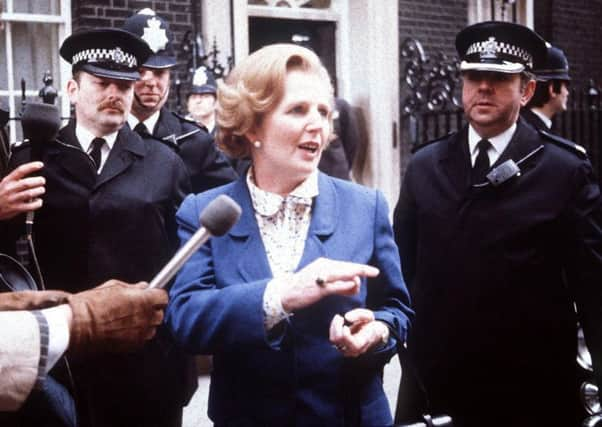Bernard Ingham: Thatcherism is in save hands with Theresa May


And so she intervened, among other things, to control the money supply, promote industrial and commercial renewal, curb trade union abuse, recover the Falklands, enable tenants to buy council houses, through privatisation, by floating the pound and freeing up an economy after 40 years of socialist bias.
At the same time, she told us that “there is no such thing as society” – a comment ludicrously misinterpreted by, among many, the Archbishop of York – in order to emphasise personal responsibility. “Society”, she said, is not the state but you and me and as responsible citizens we cannot cast our duties on to it.
Advertisement
Hide AdAdvertisement
Hide AdIt is true that May sounds more interventionist than Thatcher but overall Thatcher’s basic Conservative philosophy remains intact. May is a woman of her time and is reacting to gross excess in the so-called free market.
Free markets do not exist anywhere in the democratic world. They are regulated to try to prevent downright fraud, hold a balance between entrepreneurial flair and exploitation and promote freer and fairer trade.
Nobody can argue that May should hold her hand after the British Home Stores pensions scandal and the propensity for public and private sector executives to reward themselves but not the poor, bloody infantry who help to create wealth.
May is operating against a background of capitalist excess. And these capitalists, if they were as clever as they think they are, would have demanded government help in cleaning up the system long ago.
Advertisement
Hide AdAdvertisement
Hide AdInstead, they witter on about tax cuts, government grants and incentives and, blow me down, less regulation. We are not best served by modern management any more than we were when the unions were wrecking our economy.
I am far from sure whether May’s idea of putting workers on company boards is the best way of intervening. The issue is surely how constructive advice and criticism can be secured from the shop floor if it is only the puppets of union barons who make it to the boardroom to intensify their class war.
As for May overseeing the end of Thatcher’s aim of “small government”, I doubt it. She must surely have heard of Cecil Parkinson’s first law of government: namely, that the more government is involved the more the price goes up. Superficially, the cause of minimal government is not advanced by the willingness to chuck a total of £12bn over five years at the NHS and state education. But it will be worth the price if the government secures a much more responsive and responsible management.
It is a sad fact that “small government” Thatcher positively threw money at the police without a commensurate improvement in performance.
Advertisement
Hide AdAdvertisement
Hide AdIn short, let’s cut the claptrap. I do not believe that May is ditching the Thatcher doctrine of relatively free markets, minimal government, lower taxes and personal responsibility. She is merely adapting Conservatism to current circumstances.
Philosophically, there is not a blade of grass between these women of deep religious conviction – only language, personality and “events, dear boy, events” over the last 25 years.